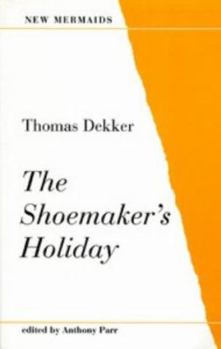The Shoemaker's Holiday
Select Format
Select Condition 
Book Overview
Bernard Sahlin's new adaptation streamlines the dialogue for contemporary audiences and makes this play extremely playable.
Format:Paperback
Language:English
ISBN:0393900622
ISBN13:9780393900620
Release Date:January 1990
Publisher:A&C Black
Length:102 Pages
Weight:0.36 lbs.
Dimensions:0.3" x 5.0" x 7.7"
Customer Reviews
3 ratings
Good, inexpensive edition
Published by Thriftbooks.com User , 18 years ago
Although some are better than others, I generally try to buy New Mermaids when I need a non-Shakespearean Early Modern play. This is a good edition for all student and most scholarly needs, with an up-to-date introduction and useful textual and footnotes (made even more useful by their position on the bottom of the page. I don't know about you, but I hate having to flip back and forth to endnotes: I'm talking to you, Oxford World's Classics). Another reason I like these editions is that one play per book means much more comprehensive introductory material. The play itself is entertaining (I have actually seen it staged) and should be interesting to anyone interested in socioeconomic issues, since it takes the titular shoemaker from his shoe shop to being Lord Mayor of London (he institutes the pancake breakfast that the title refers to). The disguise of the romantic lead as a Dutchman and his "accent" and the way war haunts what is otherwise pretty typical of city comedy provide other points of interest.
Enjoyable, Accessible, Elizabethan Comedy - Dekker's Best
Published by Thriftbooks.com User , 19 years ago
Despite the passage of four centuries, Thomas Dekker's play, The Shoemakers' Holiday (1599), is still great comedy. Dekker's hilarious plot is not easy to summarize, but it centers upon a comedic Romeo and Juliet, one in which Romeo - that is, Rowland Lacy, a young aristocrat - disguises himself as a Dutch immigrant, apprentice shoemaker to circumvent his father's objections to his wooing of a middle class Juliet, a Rose Otley. Disguises, mistaken identities, and misdirection abound, and yet this convoluted plot comes together smoothly in the final act without seeming either unduly contrived or artificial. Dekker's genial portrayal of the shoemakers' guild in London contributes to the charm of The Shoemakers' Holiday. However, colloquial Elizabethan dialogue can be challenging and good footnotes are essential. I recommend an edition published by Barron's Educational Series and edited by Merritt Lawlis. Three characters pose especial difficulty. Firk, a journeyman shoemaker, spouts a continual flow of obscure sexual innuendoes and bawdy comments. "Why here is a good laced mutton, as I promised you." Also, the conversation of Sybil, Rose's personal maid, is filled with unfamiliar colloquialisms. "And the hare's foot against the goose giblets." And, the Dutch as spoken by the apprentice shoemaker Hans (Lacy in disguise) would be nearly indecipherable without footnotes. "Ik hab all de dingen voour mack shoes groot and cleane." These examples taken out of context may make The Shoemakers' Holiday seem unintelligible, but actually Dekker's play is quite accessible to the modern reader. I did make frequent references to footnotes, but I never lost interest in the plot. Once having mastered Firk's innuendoes, Sybil's colloquialisms, and Lacy's comedic Dutch, my second reading was even more enjoyable. July, 2006 update: I recently examined in some detail "A New Adaptation by Bernard Sahlins of Dekker's The Shoemaker's Holiday". The intent - judiciously editing Dekker's play to make it more readily accessible to modern readers - is not entirely misplaced, but I found the editing to be excessive. Aside from whether all deletions were appropriate, I was especially disturbed by the replacement of some 450 words. This revised Dekker is simply too different from the original. Perhaps one-third of the changes could be defended, but the other two-thirds is unnecessary. I strongly suggest that a potential buyer directly compare the original Dekker to this revised version before making a purchase. My original recommendation still stands. I prefer Barron's Educational Series edition of The Shoemaker's Holiday. The editing by Merritt Lawlis is quite good.
An Elizabethan Pantomime
Published by Thriftbooks.com User , 23 years ago
'For nothing is purposed but mirth' Thomas Dekker tells us in his preface to this lively Elizabethan play, performed by the Lord Admiral's Players before the royal court and the Queen herself in 1599. Such mirth that was to be found in 16th century London and much that is sad and fearsome too is to be found in the story of a group of shoemakers living and working in the city. Their lives, loves and adventures are portrayed with unique historical insights of the journeyman shoemaker's trade in this fast-moving and humourous tale that eventually sees all loose ends tied, and culminates in the newly appointed Lord Mayor of London granting his shoemaker workers a 'Publicke Holiday'.






